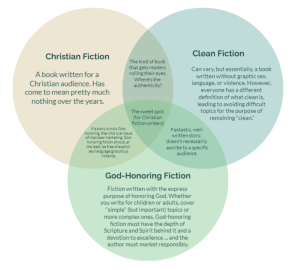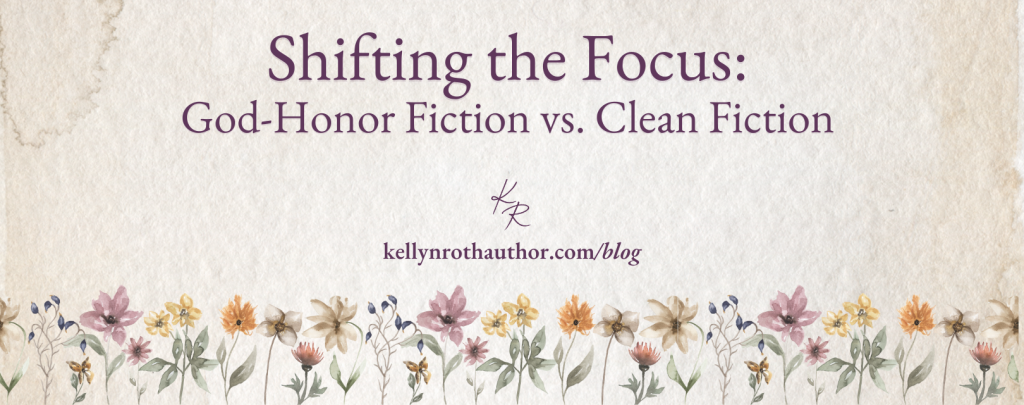Heyyyyy everybody!
I’m back with the CONTROVERSY. *puts on sunglasses and walks slowly away from an explosion as the beat drops*
Not so very long ago, I wrote a short version of this post and shared it to Instagram. It resonated with a lot of people and doubled my determination to write THIS post, so here we go!
Well, actually, before we go, disclaimers.
First, I am not writing this post to attack clean fiction. In fact, I’m going to be talking about THAT a lot in this post, too, because I do feel “cleanliness” (depending on your definition) is a big aspect of what makes Christian fiction a genre.
That said, I will be challenging the idea that “clean” is our standard for godliness in Christian fiction (and general market works written by Christians).
Second, I am primarily writing this post for Christian fiction writers. Christian fiction is a genre and an audience combined into one, but not all Christians writer Christian fiction for a wide variety of reasons. This does not make their stories less God-honoring. It just makes their purpose different.
That said, my post is geared toward Christian fiction writers, so if you don’t write that genre, this post may not be entirely applicable to you … and if you’re not a Christian, this post has nothing for you. (You’re welcome to stick around and read it, just to see what we’re up to, though!)
Without further ado, let’s talk.
The “Controversy” Part
People talk to me, and I talk to people. Therefore, I hear a lot of what has been going on in the Christian fiction community.
Honestly, there’s been so much random upheaval, and it’s exhausting.
My DMs are flooded with young Christian writers who are confused & worried about the future of the genre and how they can honor God in the midst of the constant arguments. And I keep seeing authors of all types and from all backgrounds declaring that the future of the genre, or of their specific niche, is not bright.
To which I politely say … nope. Christian fiction is not going away. And no, your particular way of writing Christian fiction is probably not going away.
If you write squeaky clean, family friendly, or just following-your-convictions Christian fiction, you’re still needed.
If you write so-called “edgy” themes and discuss tougher issues, you’re still needed.
This is no either/or situation.
That said, I’m half-convinced that a lot of this “controversy” is more a matter of people (myself included) speaking in a very black and white manner about a very nuanced subject. I don’t think there’s as much push back for one side or the other as people think.
But the loudest voices are the ones that are heard in a lot of cases, and bullies are very loud. For instance, a lot of the pushback against clean fiction I’m seeing comes from outside the Christian community … and frankly, who cares?
Meanwhile, there are the arguments about what clean is, how we personally define clean fiction, whether or not writers are justified in writing whatever they want and what those standards are as Christians, etc. It keeps going, but in truth, none of it matters so much as deciding what you’re going to do … and doing it … with God as your one and only Guide.
Beyond that, it’s semantics.
However, for me, the best way to describe what I’m trying to write isn’t clean fiction because that definition can mean pretty much anything anymore. For me, it’s God-honoring fiction.
That said, let’s talk about God-honoring fiction.
But first, let me clarify something …
Another label, Kell? Seriously?
Before you get up in arms about this, I am not suggesting we STOP marketing our fiction as clean and START marketing it as God-honoring.
I do not always place a “clean” disclosure before my books, but in the right audience (the one who interprets that as “free of graphic sex and graphic language”), I will do so.
Further, I think trying to change the labels isn’t going to work. I’ve known communities who have tried (Flinch-Free Fiction, anyone?), but in the end, we seem to have settled on “clean” to describe … a wide variety of books, but in general, a common idea:
No graphic sex. No filthy mouths. No gratuitous violence.
And though, again, clean fiction has its issues (lack of definition, largely), it does help a lot of people find their community and describe what they write and/or read.
The problem is, we need to do MORE than that. I don’t want to replace clean fiction; I’m not taking anything away. I’m adding.
A lot, a lot, a LOT of Christian writers are doing this already. We are not lacking in God-honoring fiction if you search for it.
Granted, it’s not as plentiful as “just” clean, vaguely Christian fiction, but there are so many authors who are doing this that I couldn’t begin to name them all.
And they’re not just indie authors – traditional authors are (and have been for years) stepping up. Anyone who believes otherwise might not have read a ton of Christian fiction (or have not read enough).
So why does this matter to me? Well, because if we don’t define something, we can’t teach it, and we can’t implement it ourselves.
Well, okay, yes, we can, and we might not know we’re doing it, but spreading the word and making sure we’re not just defining Christian fiction as “clean fiction with a dash of Christianity.”
But what does God-honoring fiction mean to me?
What is God-Honoring Fiction?
All of us Christians are ascribing to one goal even though we’re doing different things.
(Kind of reminds me of some Bible verses about the Body of Christ, but whatever …)
Do we have a definition of what that “one goal” is?
Yes. We’re all trying to honor God.
In this graphic below, I break down a little of what I see as God-honoring fiction. (Spoiler alert: it doesn’t NOT include cleanliness by the looser definitions!)

To be honest, I think MOST Christian fiction authors are writing God-honoring fiction as long as our main focus is pleasing the Lord … not pleasing our audience or pleasing ourselves.
Of course, some of it is about your heart. You have to be follow God to write Christian fiction.
If you’re pursuing the Lord, you’ll be able to pursue writing excellent fiction and discern what kind of books you should be writing. It’s not like God is a “leave you in the lurch” kind of Leader!
And for all the little details …
Well, we’re all called differently.
I’ve heard a lot of talk about how Christians are being pressured to “change with the times,” and how this is affecting the Christian fiction genre.
In many ways, “changing with the times” doesn’t really happen when it comes to God’s leading. Regardless of how the Christian fiction genre adjusts over the years, YOUR approach must be your own.
The Lord equips us to write “in such a time as this,” and that is not a promise that has an expiration date. We won’t need to follow trends … again, we just need to honor the Lord.
All other feedback, all other hatred (or love), matters little next to that.
As I noted in my post not too long ago, Christians should be focusing their marketing on the audience God is leading them to serve. This means we will have different things to say as Christians depending on who our audience is.
It’s not about people-pleasing. It’s about pleasing the Lord by obeying His guidance in our life.
So what does this mean for us writers?
Honestly, I’d like to see more confidence in the average Christian fiction writer.
Less need to constantly explain ourselves.
More focus on doing whatever the individual is led to do. To sharing whatever message the Lord leads them to share.
This doesn’t mean never taking criticism, nor does it mean not continuing to improve and grow as a person and as a writer. In fact, a big part of writing in a way that honors God is writing well AND growing as people, following God’s leading wherever it takes us, even if it’s somewhere unexpected.
But it does mean being willing to stand by what God tells you to do, even if it’s unpopular … or unpopular in certain groups, which is what I see more often.
In summary …
We’re writing for the Lord.
This should be a joyous, happy, freeing thing!
Why can’t we act like it?
Honestly, of all the genres in the world, this is the one that’s going to cause the most worry unless we take a hold on it.
I mean, there’s a lot of pressure in writing as a Christian fiction author. There’s a lot of pressure amongst Christians to do it a certain way. And there’s a LOT of intolerance toward any slight variance to the norm, whatever “norm” you ascribe to.
I guess, simply put, there’s a lot of asking legs to be arms and arms to be noses and heads to be toes.
Let’s work on refining our marketing and confidently proclaiming what the Lord has led us to proclaim rather than worrying about the opinions of others who you are not led to serve.
There are probably readers for almost every niche out there. So find yours … and don’t go whining about it or pursuing readers who aren’t in your niche. It’s that simple. Even if your niche is smaller, it’s better to focus your marketing and reach less people than try to sell books to people who won’t get anything out of them.
I’ve given up worrying about what readers who I’m not writing for will think of my books. I wish you would, too! Because after all, do those thoughts (and worries) really benefit you? Do they help the people you actually want to help?
Or do they just serve to distract you from God’s actual leading in your life?
Dear Christian fiction writer, you let yourself become this battered and bruised. In 90% of the situations I’m told about, it’s either all in the author’s head … or they’re letting one negative voice amongst many positive ones rule the roost.
We are not the average person, though. We have Christ’s Spirit to help us. This, too, can be overcome.
Let’s overcome it.
Honorable Mentions
… not sure that header works, but whatever.
There are people in this world who are trying to promote God-honoring fiction in a really cool way! A couple organizations that I wanted to mention are Glory Writers and Protect Clean Fiction.
Though I am not associated with either of these organizations, and I’m pretty sure we’re doing slightly different things (YAY! We need all the different things), I do feel that the people behind these groups have the best interest of the Christian fiction market in mind in what they’re promoting.
So if you need some encouragement, there’s a place to start!
Anddddd of course I’ve loved working with young writers through the Author Conservatory (#dayjobshoutout) because they are all truly emulating this desire to honor the Lord … even if that path is not through the traditional (non-traditional?) Christian fiction route. Y’all (along with my many author friends) inspire ME!
TTFN!
~Kell~
Are you interested in getting to know me & my books better? Join my email list!


